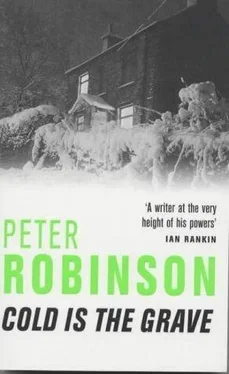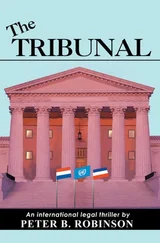“She’s always looked older than her years,” Banks said. “It’s got a lot of boys into trouble. Well, I’m relieved to hear she’s not on your books, but I don’t think we’re a lot further forward than when I first arrived, do you? Is there anything you can do to make amends?”
Aitcheson paused, then said, “I shouldn’t, but I can give you the photographer’s name and address. Craig Newton. As I said, he used to do a spot of work for us now and then, and we’ve still got him on file. We just got a change-of-address notice from him a short while ago, as a matter of fact.”
Banks nodded. “It’ll have to do.” Aitcheson scribbled down an address for him. It was in Stony Stratford, commuter country. Banks stood up to leave. “One more thing,” he said.
“Yes?”
“Those photos of Louisa on your Web site. Get rid of them.”
Aitcheson allowed himself a self-satisfied smile. “Actually,” he said, “I’ve done that already. While you were waiting.”
Banks smiled back and tapped the side of his nose with his forefinger. “Good lad,” he said. “You’re learning.”
Back at his hotel, Banks picked up the telephone and did what he had been putting off doing ever since he discovered he was bound for London the previous day. Not because it was something he didn’t want to do, but because he was nervous and uncertain of the outcome. And there was so much at stake.
She answered on the fourth ring. Banks’s heart pounded. “Sandra?”
“Yes. Who is this? Alan?”
“Yes.”
“What do you want? I’m in a bit of a hurry right now. I was just on my way out.”
“Off somewhere with Sean?”
“There’s no need to make it sound like that. And as a matter of fact, no, I’m not. Sean’s away photographing flood damage in Wales.”
Let’s hope the flood water carries him away with it, Banks thought, but bit his tongue. “I’m in town,” he said. “In London. I was wondering if, maybe, tomorrow night you might be free for a meal. Or we could just have a drink. Lunch, even.”
“What are you doing down here? Working?”
“In a manner of speaking. Are you free?”
He could almost hear Sandra thinking across the wires. Finally, she said, “Yes. Actually. Yes, I am. Sean won’t be back until Sunday.”
“So will you have dinner with me tomorrow night?”
“Yes. All right. That’s a good idea. There’s a few things we have to talk about.” She named a restaurant on Camden High Street, not far from where she lived. “Seven-thirty?”
“Can you make it eight, just to be on the safe side?”
“Eight, then.”
“Fine. See you there.”
“See you.”
Sandra hung up and Banks was left with the dead line buzzing in his ear. Maybe she hadn’t exactly welcomed him with open arms, but she hadn’t cut him off, either. More importantly, she had agreed to see him tomorrow And dinner was far more intimate than lunch or a quick drink in the afternoon. It was a good sign.
It was already dark by late afternoon when Banks took the train out of Euston. The Virgin InterCity sped through Hemel Hempstead so fast he could hardly read the station nameplate, then it slowed down near Berkhamsted for no reason Banks was aware of except that trains did that every now and then – something to do with leaves on the tracks, or a cow in a tunnel.
Berkhamsted was where Graham Greene came from, Banks remembered from A Sort of Life , which he had read a year or two ago. Greene had been one of his favorite writers ever since he first saw The Third Man on television back in the old Met days. After that, in his usual obsessive fashion, he collected and read everything he could get his hands on, from the “entertainments” to the serious novels, films on video, essays and short stories.
He was particularly taken by the story of the nineteen-or twenty-year-old Greene going out to Ashbridge Park in Berkhamsted with a loaded revolver to play Russian roulette. It was eerie now to imagine the awkward, gangly young man, destined to become one of the century’s most famous writers, clicking on an empty chamber that autumn over seventy-five years ago, not far from where the train had just stopped.
Banks had also been impressed by Greene’s writings on childhood, about how we are all “emigrants from a country we remember too little of,” how important to us are the fragments we do remember clearly and how we spend our time trying to reconstruct ourselves from these.
For most of his life, Banks hadn’t dwelled much on his past, but since Sandra had left him a year ago, he had found himself returning over and over again to certain incidents, the heightened moments of joy and fear and guilt, along with the objects, sights, sounds and smells that brought them back, like Proust’s madelaines, as if he were looking for clues to his future. He remembered reading that Greene, as a child, had had a number of confrontations with death, and these had helped shape his life. Banks had experienced the same thing, and he thought that in some obscure, symbolic way, they partly explained why he had become a policeman.
He remembered, for example, the hot summer day when Phil Simpkins wrapped his rope around the high tree in the churchyard and spiraled down, yelling like Tarzan, right onto the spiked railings. Banks knew he would never forget the squishy thud that the body made as it hit. There had been no adults around. Banks and two others had pulled their writhing, screaming friend off the railings and stood there wondering what to do while he bled to death, soaking them in the blood that gushed from a pierced artery in his thigh. Someone later said they should have tied a tourniquet and sent for help. But they had panicked, frozen. Would Phil have lived if they hadn’t? Banks thought not, but it was a possibility, and a mistake, he had lived with all his life.
Then there was Jem, a neighbor in his Notting Hill days, who had died of a heroin overdose; and Graham Marshall, a shy, quiet classmate who had gone missing and never been found. In his own way, Banks felt he was responsible for them, too. So many deaths for one so young. Sometimes Banks felt as if he had blood on his hands, that he had let so many people down.
The train stopped in Milton Keynes. Banks got off, walked up the stairs and along the overpass to the station exit.
He had never been to Milton Keynes before, though he had heard plenty of jokes about the place. One of the new towns, built in the late sixties, it was constructed on a grid system, with planned social centers, hidden pedestrian paths, rather than pavements, and hundreds of roundabouts. It sounded like the sort of design that would go down well in America, but the British sneered at it. Still, at not much over half an hour by train from London, and a much cheaper place to live, it was ideal commuting territory.
As it was, it was too dark to see much of the place. The taxi seemed to circle roundabout after roundabout, all of them with numbers, like V5 and H6. Banks didn’t see any pavements or people out walking. He hadn’t a clue where he was.
Finally, when the taxi turned into Stony Stratford, he found himself on a typical old village High Street, with ancient pubs and shop facades. For a moment, he wondered if it was all fake, just a faux finish to give the illusion of a real English village in the midst of all that concrete-and-glass modernity. It seemed real enough, though, and when the taxi pulled into a street of tall, narrow prewar terrace houses, he guessed that it probably was real.
The youth who answered the door looked to be in his mid- to late twenties; he wore black jeans and a gray sweatshirt advertising an American football team. He was about Banks’s height, around five feet eight or nine, with curly dark hair and finely chiseled features. His nose had a little bump at the bridge, as if it had been broken and not properly set, and he was holding something that looked like a squat vacuum flask, which he kept tipping gently from side to side. Banks recognized it as a developing tank.
Читать дальше












